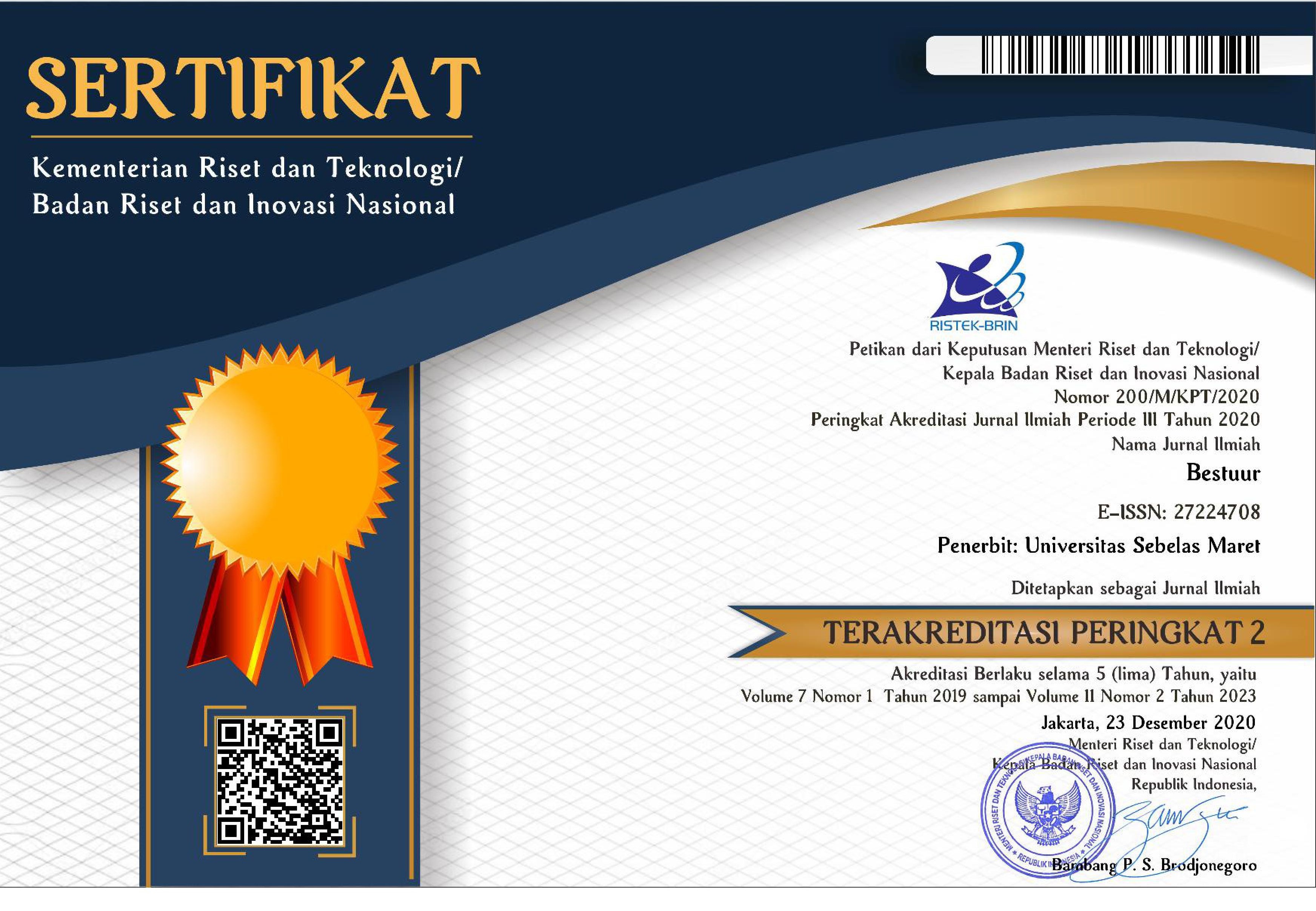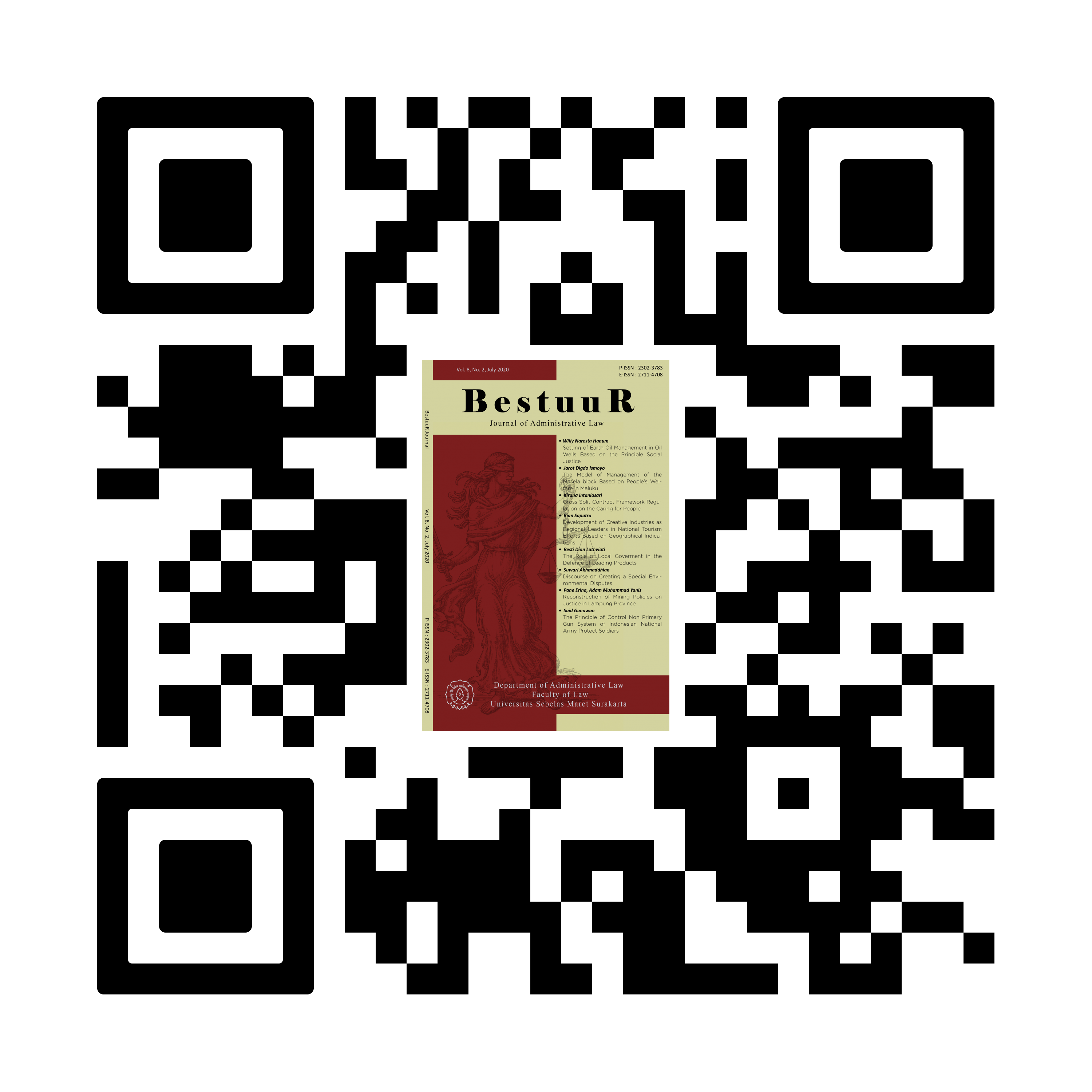Detection of Digital Law Issues and Implication for Good Governance Policy in Indonesia
Abstract
The concept of good governance is essential to be utilized to analyze updating digital law and society. However, at the practical level, it can still be seen the lack of implementation of the principle of properness, transparency, effectiveness, accountability, participation, and human rights by the government to respond to the economic growth and criminal trend within the digital era. This study discusses good governance as a concept that can be used to analyze digital law and society. Especially in the cybercrime and e-businesses in Indonesia, the concept of good governance may utilize the social impact. This study uses socio-legal research, which combines interviews and literature review. This article will start to discuss the relevance of the study of good governance, digital law, and society in Indonesia's social and judicial context with the Electronic Information Transaction Law. This study concludes that during the growth of the digital economy, Indonesia has suffered from cyber-attacks, scams, phishing, malware injection, etc., which may need more extraordinary law enforcement. At the same time, the increasing number of e-commerce, fintech, social media, digital start-up, etc., need support from proper facilitation by the government. Good governance may provide a tool to cover the objective and balance its outcomes in the digital era.
Keywords
Full Text:
PDFReferences
Amalia, P. (2021). Multinational Corporation ’ s Investments made through its Subsidiary under The Latest Generation of Investment Treaties Latest Generation Of Investment Treaties. Indonesian Journal of International Law, 19(1). https://doi.org/10.17304/ijil.vol19.1.5
Bakker, K., & Ritts, M. (2018). Smart Earth: A meta-review and implications for environmental governance. Global Environmental Change, 52(March), 201–211. https://doi.org/10.1016/j.gloenvcha.2018.07.011
Basukie, J., Wang, Y., & Li, S. (2020). Big data governance and algorithmic management in sharing economy platforms: A case of ridesharing in emerging markets. Technological Forecasting and Social Change, 161(September), 120310. https://doi.org/10.1016/j.techfore.2020.120310
Bednarz, Z., & Manwaring, K. (2022). Hidden depths: The effects of extrinsic data collection on consumer insurance contracts. Computer Law and Security Review, 45(1), 105667. https://doi.org/10.1016/j.clsr.2022.105667
Belanche-Gracia, D., Casaló-Ariño, L. V., & Pérez-Rueda, A. (2015). Determinants of multi-service smartcard success for smart cities development: A study based on citizens’ privacy and security perceptions. Government Information Quarterly, 32(2), 154–163. https://doi.org/10.1016/j.giq.2014.12.004
Bertot, J. C., Seifert, J., & Jaeger, P. (2015). Securing the homeland in the digital age: Issues and implications for policy and governance. Government Information Quarterly, 32(2), 105–107. https://doi.org/10.1016/j.giq.2015.04.001
Böck, L., Fejrskov, M., Demetzou, K., Karuppayah, S., Mühlhäuser, M., & Vasilomanolakis, E. (2022). Processing of botnet tracking data under the GDPR. Computer Law and Security Review, 45, 105652. https://doi.org/10.1016/j.clsr.2021.105652
Burton, D. L. (2015). Digital Dilemmas: Power, Resistance and the Internet. Government Information Quarterly, 32(2), 218–219. https://doi.org/10.1016/j.giq.2015.02.003
Chatfield, A. T., Reddick, C. G., & Brajawidagda, U. (2015). Government surveillance disclosures, bilateral trust and Indonesia-Australia cross-border security cooperation: Social network analysis of Twitter data. Government Information Quarterly, 32(2), 118–128. https://doi.org/10.1016/j.giq.2015.01.002
Custers, B., & Malgieri, G. (2022). Priceless data: why the EU fundamental right to data protection is at odds with trade in personal data. Computer Law and Security Review, 45, 105683. https://doi.org/10.1016/j.clsr.2022.105683
Elisabet, M., & Dewi, Y. K. (2021). Digital Services Tax Regulation and Wto Non-Discrimination Principle: Is the Deck Stacked? Indonesian Journal of International Law, 19(1). https://doi.org/10.17304/ijil.vol19.1.2
Esposito, F. (2022). The GDPR enshrines the right to the impersonal price. Computer Law and Security Review, 45, 105660. https://doi.org/10.1016/j.clsr.2022.105660
Ferrari, M. V. (2022). The platformisation of digital payments: The fabrication of consumer interest in the EU FinTech agenda. Computer Law and Security Review, 45, 105687. https://doi.org/10.1016/j.clsr.2022.105687
Gonzálvez-Gallego, N., & Pérez-Cárceles, M. C. (2021). Cryptocurrencies and illicit practices: The role of governance. Economic Analysis and Policy, 72, 203–212. https://doi.org/10.1016/j.eap.2021.08.003
Green, B. (2022). The flaws of policies requiring human oversight of government algorithms. Computer Law and Security Review, 45, 105681. https://doi.org/10.1016/j.clsr.2022.105681
Hage, M. Y., & Ningrum, P. K. (2022). Corrective Justice and Its Significance on the Private Law. JILS (Journal of Indonesian Legal Studies), 7(1), 1-30. https://doi.org/10.15294/jils.v7i1.46691
Janowski, T., & Janssen, M. (2015). Tribute to John Bertot and message from the incoming. Government Information Quarterly, 32(2), 103–104. https://doi.org/10.1016/j.giq.2015.03.004
Koos, S. (2022). Digital Globalization and Law. Lex Scientia Law Review, 6(1), 33–68. https://doi.org/10.15294/lesrev.v6i1.55092
Koussouris, S., Lampathaki, F., Kokkinakos, P., Askounis, D., & Misuraca, G. (2015). Accelerating Policy Making 2.0: Innovation directions and research perspectives as distilled from four standout cases. Government Information Quarterly, 32(2), 142–153. https://doi.org/10.1016/j.giq.2015.03.001
Lestantri, I. D., Janom, N. B., Aris, R. S., & Husni, Y. (2021). The perceptions towards the digital sharing economy among SMEs: Preliminary findings. Procedia Computer Science, 197(2021), 82–91. https://doi.org/10.1016/j.procs.2021.12.121
Meijer, A. (2015). E-governance innovation: Barriers and strategies. Government Information Quarterly, 32(2), 198–206. https://doi.org/10.1016/j.giq.2015.01.001
Nottingham, E., Stockman, C., & Burke, M. (2022). Education in a datafied world: Balancing children’s rights and school’s responsibilities in the age of Covid 19. Computer Law and Security Review, 45, 105664. https://doi.org/10.1016/j.clsr.2022.105664
Ooi, V., Kian Peng, S., & Soh, J. (2022). Blockchain land transfers: Technology, promises, and perils. Computer Law and Security Review, 45, 105672. https://doi.org/10.1016/j.clsr.2022.105672
Panagopoulos, A., Minssen, T., Sideri, K., Yu, H., & Compagnucci, M. C. (2022). Incentivizing the sharing of healthcare data in the AI Era. Computer Law and Security Review, 45, 105670. https://doi.org/10.1016/j.clsr.2022.105670
Quigley, K., Burns, C., & Stallard, K. (2015). “Cyber Gurus”: A rhetorical analysis of the language of cybersecurity specialists and the implications for security policy and critical infrastructure protection. Government Information Quarterly, 32(2), 108–117. https://doi.org/10.1016/j.giq.2015.02.001
Rana, N. P., & Dwivedi, Y. K. (2015). Citizen’s adoption of an e-government system: Validating extended social cognitive theory (SCT). Government Information Quarterly, 32(2), 172–181. https://doi.org/10.1016/j.giq.2015.02.002
Reddick, C. G., Chatfield, A. T., & Jaramillo, P. A. (2015). Public opinion on National Security Agency surveillance programs: A multi-method approach. Government Information Quarterly, 32(2), 129–141. https://doi.org/10.1016/j.giq.2015.01.003
Rukanova, B., Wigand, R. T., van Stijn, E., & Tan, Y. H. (2015). Understanding transnational information systems with supranational governance: A multi-level conflict management perspective. Government Information Quarterly, 32(2), 182–197. https://doi.org/10.1016/j.giq.2014.12.003
Sabani, A., Farah, M. H., & Sari Dewi, D. R. (2019). Indonesia in the spotlight: Combating corruption through ICT enabled governance. Procedia Computer Science, 161, 324–332. https://doi.org/10.1016/j.procs.2019.11.130
Schellekens, M. (2022). Data from connected cars for the public cause. Computer Law and Security Review, 45(December 2020), 105671. https://doi.org/10.1016/j.clsr.2022.105671
Sittel, R. (2015). Public Libraries, Public Policies, and Political Processes: Serving and Transforming Communities in Times of Economic and Political Constraint. Government Information Quarterly, 32(2), 219–220. https://doi.org/10.1016/j.giq.2015.02.005
Stahl, B. C., Rodrigues, R., Santiago, N., & Macnish, K. (2022). A European Agency for Artificial Intelligence: Protecting fundamental rights and ethical values. Computer Law and Security Review, 45, 105661. https://doi.org/10.1016/j.clsr.2022.105661
Suryono, R. R., Budi, I., & Purwandari, B. (2021). Detection of fintech P2P lending issues in Indonesia. Heliyon, 7(4), e06782. https://doi.org/10.1016/j.heliyon.2021.e06782
Szwajdler, P. (2022). Limitations of the Freedom of Hyperlinking in the Fields of Copyright Law, Trademark Law and Unfair Competition Law: Is Case-by-case Approach Sufficient? Computer Law and Security Review, 45(April 2016), 1–16. https://doi.org/10.1016/j.clsr.2022.105692
Thomas, S., Richter, M., Lestari, W., Prabawaningtyas, S., Anggoro, Y., & Kuntoadji, I. (2018). Transdisciplinary research methods in community energy development and governance in Indonesia: Insights for sustainability science. Energy Research and Social Science, 45(June), 184–194. https://doi.org/10.1016/j.erss.2018.06.021
Tylec, G., Maćkowska, K., & Kwiecień, S. (2022). Copyright trolling as threat to internet users’ legal and economic security: Comments in light of EU and US legislations. Computer Law and Security Review, 45. https://doi.org/10.1016/j.clsr.2022.105688
Valdivia, A. D., & Balcell, M. P. (2022). Connecting the grids: A review of blockchain governance in distributed energy transitions. Energy Research and Social Science, 84(October 2021), 102383. https://doi.org/10.1016/j.erss.2021.102383
Van Loon, A., & Toshkov, D. (2015). Adopting open source software in public administration: The importance of boundary spanners and political commitment. Government Information Quarterly, 32(2), 207–215. https://doi.org/10.1016/j.giq.2015.01.004
Van Mil, J., & Quintais, J. P. (2022). A Matter of (Joint) control? Virtual assistants and the general data protection regulation. Computer Law & Security Review, 45(February), 105689. https://doi.org/10.1016/j.clsr.2022.105689
Whitacre, B., & Rhinesmith, C. (2015). Public libraries and residential broadband adoption: Do more computers lead to higher rates? Government Information Quarterly, 32(2), 164–171. https://doi.org/10.1016/j.giq.2015.02.007
Wiedemann, K. (2022). Profiling and (automated) decision-making under the GDPR: A two-step approach. Computer Law and Security Review, 45, 105662. https://doi.org/10.1016/j.clsr.2022.105662
You, C. (2022). Half a loaf is better than none: The new data protection regime for China’s platform economy. Computer Law and Security Review, 45, 105668. https://doi.org/10.1016/j.clsr.2022.105668
Yudiana, T. C., Rosadi, S. D., & Priowirjanto, E. S. (2022). The Urgency of Doxing on Social Media Regulation and the Implementation of Right to Be Forgotten on Related Content for the Optimization of Data Privacy Protection in Indonesia. Padjadjaran Jurnal Ilmu Hukum, 9(1), 24–45. https://doi.org/10.22304/pjih.v9n1.a2
Zolotar, O. O., Zaitsev, M. M., Topolnitskyi, V. V., Bieliakov, K. I., & Koropatnik, I. M. (2022). Prospects and Current Status of Defence Information Security in Ukraine. Hasanuddin Law Review, 8(1), 18–29. https://doi.org/10.20956/halrev.v8i1.3582
DOI: https://doi.org/10.20961/bestuur.v10i1.59143
Refbacks
- There are currently no refbacks.
Copyright (c) 2022 Awaludin Marwan, Diana Odier-Contreras Garduño, Fiammetta Bonfigli

This work is licensed under a Creative Commons Attribution 4.0 International License.
|











_CROSREF.jpg)




